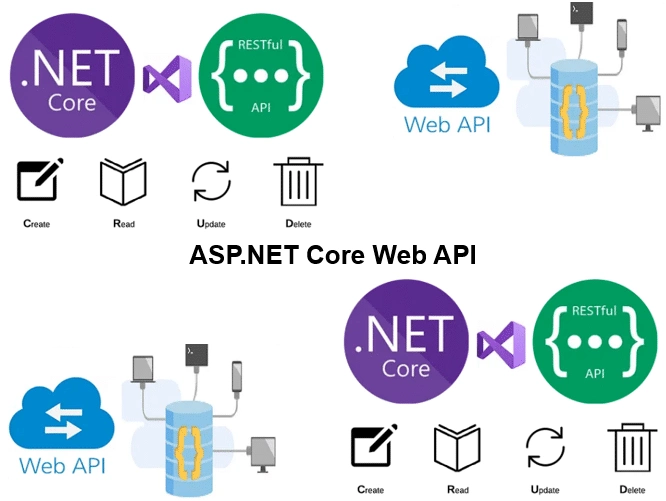-
Learning by doing
-
Trainers with practical experience
-
Classroom training
-
Detailed course material
-
Clear content description
-
Tailormade content possible
-
Training that proceeds
-
Small groups
In the course ASP-NET Core Web API from SpiralTrain developers and architects learn to create flexible and interoperable RESTful services, addressing key concepts such as routing, serialization, versioning, and security. The course program provides hands-on experience in building powerful APIs using the ASP.NET Core framework.
The course ASP.NET Core Web API starts with an overview of the architecture of REST Services, in particular the Web API. Standard features of REST such as resources with IDs, URL patterns and standard HTTP methods are discussed. Attention is also paid to the creation and structure of a Web API project in Visual Studio.
Next routing in the ASP.NET Core Web API is covered, where the definition of routes, routing parameters, route configuration and routing attributes are treated. Attention is also paid to controllers and the mapping of routes to controller actions.
Then the course ASP.NET Core Web API covers request and response handling and the implementation of controller actions that produce responses based on incoming requests. Furthermore, model and parameter binding, content negotiation and the processing of HTTP status codes are treated.
Part of the ASP.NET Core Web API course also includes data validation and error handling. Model binding, model validation and validation errors are discussed. Error responses, exception filters and the implementation of global error handling are covered as well.
Security and authentication mechanisms in the Web API are also part of the course content. Topics include various authentication mechanisms, role base authorization, the implementation of authentication with JSON Web Tokens (JWT) and the protection of sensitive data with HTTPS.
Finally attention is paid to data access with the Web API, the Open Data Protocol (OData) and the Entity Framework. Explained is how OData CRUD operations can be performed on Entities based on Model classes.
The course ASP.NET Core Web API is intended for Web Developers who want to understand and develop REST APIs with ASP.NET Core.
To participate in this course, knowledge of Web Protocols such as HTTP and HTTPS is desirable and knowledge of the fundamentals of C# is required.
The course alternates between theory and practice. Explanations using slides and demos are followed by practical exercises.
After successfully completing the course, the attendants will receive a certificate of participation in ASP.NET Core Web API.

Module 1 : Intro Web API |
Module 2 : Routing and Controllers |
Module 3 : Requests and Responses |
|
What is Web API? REST Services Comparison with WCF REST versus SOAP Resources Unique ID's URL Patterns HTTP Methods Routing Content Negotiation Web API Projects |
Handling HTTP Requests API Controllers Action Methods Routing Requests Action Selection Routing Templates Routing Configuration Routing Parameters Routing by Attribute Routing in Web API2 Self Hosting |
HTTP Requests GET, POST, PUT and DELETE HTTP Verbs Model Binding Parameter Binding Media Types Content Negotiation Creating HTTP Responses Handling Status Codes Serialisatie HttpClient |
Module 4 : Data Validation |
Module 5 : Security |
Module 6 : Data Access |
|
Model Binding Model Validation Data Annotations Validation Properties Under Posting Over Posting Validation Errors Http Errors HttpResponseException Exception Filters Global Error Handling |
Authentication Thread.CurrentPrincipal Authorization Role Based Authorization AuthorizeAttribute Filter Prevent CSRF Attacks Enabling CORS Authentication Filter Authentication Mechanisms JSON Web Tokens Working with SSL |
Open Data Protocol CRUD Operations OData Packages Model Classes Using Entity Framework OData Endpoints OData Controllers Query Entity Set Creating Entities Updating Entities Deleting Entities |
